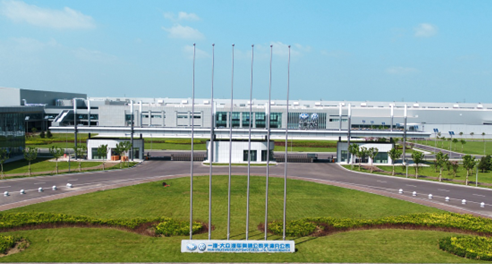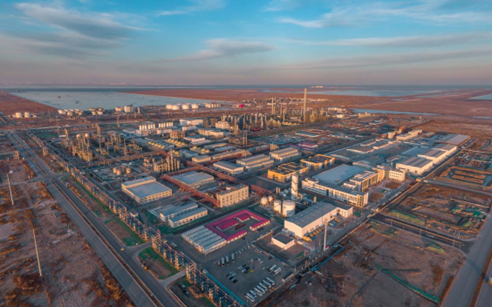By Jin Bo, People's Daily
A green photovoltaic project was recently put into use at the north China base of FAW-Volkswagen, which is located in the Tianjin Economic-Technological Development Area (TEDA). The 17MW project is expected to provide 17 million kWh of clean electricity for the production base each year.
Green manufacturing philosophy runs through every link of the FAW-Volkswagen plant, from designing to operation, and from raw material to waste management.
It is learned that the FAW-Volkswagen plant has launched over 100 projects of energy conservation and emission reduction since it started operation. It employs an intelligent energy management system that monitors energy consumption in real time, taps into the potential of energy conservation with big data technology, and widely applies new technologies to further cut energy consumption. Currently, the plant's energy consumption per 10,000 yuan ($1,454.6) of output stands at only 7.66 kilogram of standard coal, which is far lower than the industry's average.

The north China base of FAW-Volkswagen is just one of the many green plants built in the TEDA. Over the recent years, focusing on green manufacturing, the TEDA has worked to advance the construction of green industrial parks in a systematic manner and guided the development of industrial parks with a clean production philosophy, which effectively improved regional high-quality development.
So far, the TEDA has been home to 22 green plants and 12 green supply chain management enterprises at national level, as well as 55 municipal-level green factories. It has preliminarily built a cluster of green manufacturing enterprises, leading the industry toward low-carbon development.
The TEDA is pushing for green transition of enterprises among key industries and in major fields, striving to put both energy consumption and intensity under control.
It has set up a threshold of carbon dioxide emission intensity for enterprises newly settling in the area, and ristricted the entry of projects engaged in high-polluting and high-emission industries. By doing so, the TEDA has promoted technological transformation of enterprises and green upgrading for relevant industries.
"It calls for a stronger awareness for circular economy and improving the utilization efficiency of resources to build a green manufacturing system," said an official with the TEDA.
According to the official, the TEDA, by actively building circular industrial chains in sectors such as petrochemical and equipment manufacturing, has worked to improve the ratio of green manufacturing in key industries through green production, energy conservation, green supply chains and purchases of green electricity. It has launched in-depth carbon reduction and accelerated the upgrading of traditional industries.
To lead enterprises onto a path of green manufacturing, the TEDA has established a complete policy system that supports green manufacturing and encourages enterprises to explore green transition.
In May 2022, the TEDA released a list of the best 30 enterprises of the year in terms of environmental protection, which involved biopharmaceutical, automobile, precision instrument, chemical engineering and other industries.

The 30 enterprises' comprehensive energy consumption and fresh water consumption accounted for 16 percent and 20 percent, respectively, of the total of the 346 enterprises evaluated. Their atmospheric, wastewater, and solid waste emissions accounted for 12 percent, 15 percent and 24 percent of the total. Meanwhile, they contributed to over 70 percent of total taxation and half of the total industrial output of the 346 enterprises.
It is learned that the TEDA has released the annual list for 19 years in a row. Green manufacturing makes up 20 percent in the index evaluation system, while the rest 80 percent comes from eight key indicators such as tax revenue per mu (667 square meters), energy consumption per mu and pollutant discharge.
"The evaluation has effectively encouraged enterprises to upgrade production techniques, improve management and increase investment in governance, which helps promote the high-quality development of industrial parks," said Xu Fei, deputy director of the management committee of the TEDA. In general, listed enterprises reported obvious increase in the tax revenue per mu, while their energy consumption, wastewater discharge and waste gas emissions have significantly dropped.
The plant of Novo Nordisk, a leading global healthcare company, has been included in the list for many years. "We are a producer of insulin. Ninety percent of our products are liquid, and we use a massive amount of water during production. Therefore, water conservation is of huge importance for us. Utilizing big data, artificial intelligence and other new technologies, we have constantly optimized our water supply system, realized on-demand production of water for injection, and introduced a reprocessing system for recycled water. Our annual water consumption has been cut by 27 percent," said Peng Cheng, manager of the engineering department of Novo Nordisk (China).
According to Peng, nine suppliers of the company have promised to use green energy, the company itself is also purchasing green electricity and vapor, trying to eliminate fossil energy out of its energy supply structure.
Being included in the list is not the final destination, said Xu, adding that those listed shall set an example in green manufacturing and green investing for other enterprises.
On an intelligent environmental protection platform of the TEDA, enterprises can check their evaluation and rankings, so that they are able to improve their weak links to better achieve green manufacturing, Xu said.


